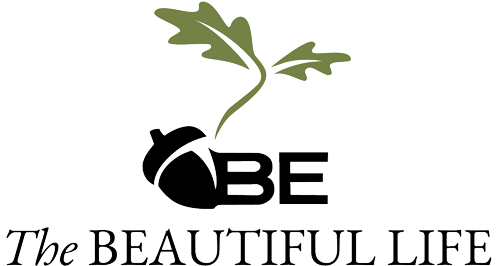
h“Plants love us. They help us reclaim our health and our whole selves. Plants are healers.”
– Robin Rose Bennett
I love herbs.
These simple, aromatic plants create a sensory experience in any garden. Even the tiniest sprigs can power-punch all the senses with their texture, flavor, beauty, and especially their aroma. Other than the bees buzzing merrily to collect their pollen, herbs grow silently with the potential to uplift, heal, and heighten.
Herbs Uplift
Herbs are personal.
The herbs I plant are those that speak to my senses. Often, I will take a leaf from the plant in my fingers, rub it slightly and then hold both the bruised leaf and my fingers to my nose. Quickly, smell and taste receptors, working hand in hand, tell me if that herb is what my body needs, desires, or repulses. More often than not, the scent and visual appearance of most herbs win me over and receive a place of honor in my cultivated soil.
My herb garden began with the herbs that I recognized from my mother and grandmothers’ heritage gardens: mint, parsley, sage, dill, chives, and nasturtiums. Of course, I branched into the exotic herbs used in Italian and Latin American cuisine, such as basil, cilantro, and oregano. After living in France, my mouth craved the flavors, and my memory senses sought out the visual beauty and scents of lavender, thyme, rosemary, anise, tarragon, and fennel.
At first, I planted my window boxes under the south-facing windows. The Provincial lavender found its home on the rock wall coming up the driveway. Amid the tomatoes, squash, and other vegetables in our upper-terrace garden, I stuck chives, mint, sweet basil, dill, thyme, lemon thyme, rosemary, and white-flowered lavender. As we finished the front walk by laying large, flat rocks, we planted the woolly thyme in the cracks between them. Over the years, the woolly thyme has spread like a carpet. Not only did the climbing roses overtake the gazebo in the vegetable garden, but eventually, so did my herbs. The vegetables transferred to new raised beds on the lower terrace so that I could add unique varieties of sage, thyme, basil, tarragon, fennel, lemon balm, chervil, marjoram, oregano, mint and more—some perennial and some annual in our climate and altitude. My husband added fig, blueberry, and pomegranate trees as well as thornless raspberries. Within a few years, we built three new vegetable beds in another area of the yard. Of course, more herbs have found another home in the previous raised beds after the spring plants like lettuce, radishes, and peas have finished their season.
Because most of them like to spread and wander, unless they are bullying the space of another plant, I allow my happy and thriving plants to move and meander wherever they desire. In fact, the fennel has moved three feet from where it originally sprang up.
Why so many herbs?
In their unique way, these spirit-lifting plants offer me joy as I wander through my gardens in the coolness of the evening or the early morning after the dew has settled. Touching the soil, the stalks, the leaves, the blossoms—all parts of them are like an aromatic candle to illuminate my thoughts and rejuvenate my will.
My initial French lavender has grown to incredible proportions to overtake the entire garden wall as one comes up our driveway. It must span at least 4 feet in diameter in all directions. Granted, I should have cut it back, kept it trimmed, and domed its shape. Instead, I just let it grow spontaneously to its glorious and prominent place in my front yard. Hundreds of tiny honeybees dot the flowers in reverie, blissfully gathering pollen. Since the lavender’s lilac-colored flowers extend over the driveway cobbles where people must brush against them to walk to my side door, the bush, like an excited puppy, grabs for anyone’s affection. Frequently, people, freshly painted with lavender pollen as they come to my door, ask the same question: “What is that beautiful smell?”
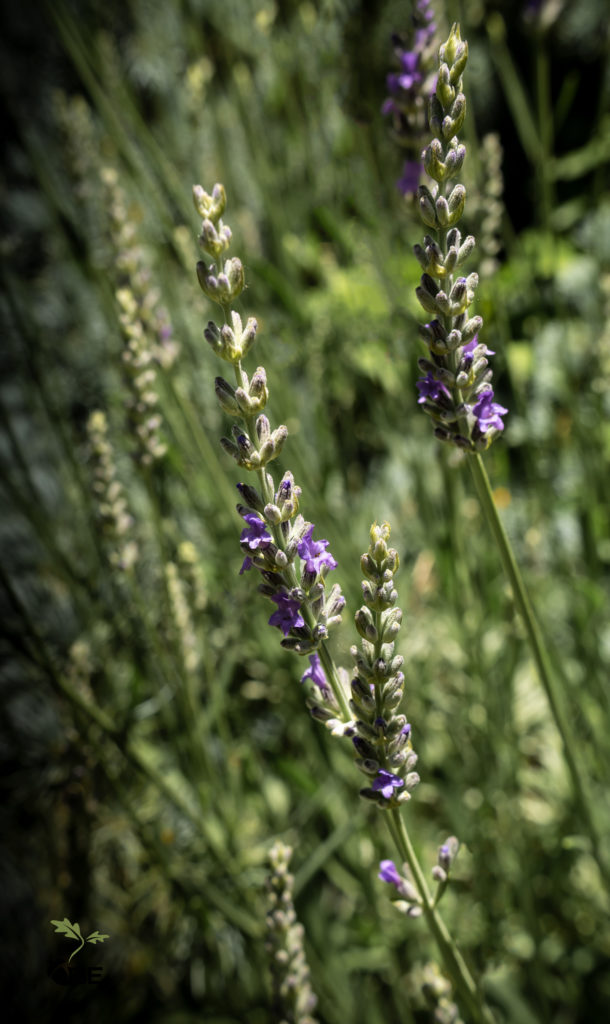
“The flower doesn’t dream of the bee. It blossoms and the bee comes.”
– Mark Nepo
Lavender reigns as my foremost uplifting herb.
It brings me peace when I smell it in the air.
It restores my ability to cope when I bury my face in its leaves or rub my fingers on the flowers and bring them to my nose.
I clip bundles of the flowers, wrap their stems in jute, and hang them in my home where their aroma wafts through the hallways and into each room.
I lay sprigs on my pillow in the morning so that by night when I return to bed, the scent comforts me.
I have steeped the flowers in warm milk to make a custard ice cream and tossed them in sugar cookies and cakes.
It invokes my memories of the Provincial world where I once enjoyed living with its quaint quietness.
Lavender reminds me to be grateful as it graciously blesses my life.
Herbs Heal
Whenever I was sick, my mother retreated to her arsenal of dried herbs in the cupboard to make me holistic healing teas. All she needed was the antique Chinese apothecary cabinet with the small drawers to look like an official herbalist with her various remedies. I drank chamomile or licorice tea for an upset stomach, spearmint or peppermint tea for queasiness or an overall cold, and many others like horehound and comfrey for other purposes. For daily health, we drank plenty of aloe vera juice before it became a popular ingredient. My maternal grandmother made herb-blended pine pitch, poultices, and salves for our wounds. Moreover, my maternal great-grandmother made cough syrup and cough drops from medicinal herbs plus honey, lemon, and vinegar. Although I didn’t understand as a youth what all the herbs did for my body, I learned from my maternal heritage that herbs are nature’s greatest healers of body, mind, and spirit.
I love to fiddle with the feathery fennel fronds, chewing on a few leaves to taste the tangy black licorice flavor that also opens up my airways.
Mint gives a sense of well-being to my whole body. Bruising it slightly and adding it fresh to cold drinks augments the restorative powers of this incredible herb.
Rubbing the citronella lemon balm leaves on my body repels biting insects.
Lemongrass and cilantro flavor so many of my beloved Southeast Asian dishes from Thailand, Cambodia, and Indonesia but also offer anti-inflammatory and antioxidant properties.
In the long term, herbs used regularly in conjunction with proper nutrition will build the immune system, strengthen the skin, augment the blood flow and quality, assist the proper functioning of the body’s essential systems, and enliven the overall wellbeing.
Of course, I hold to the philosophy: lavender cures everything.
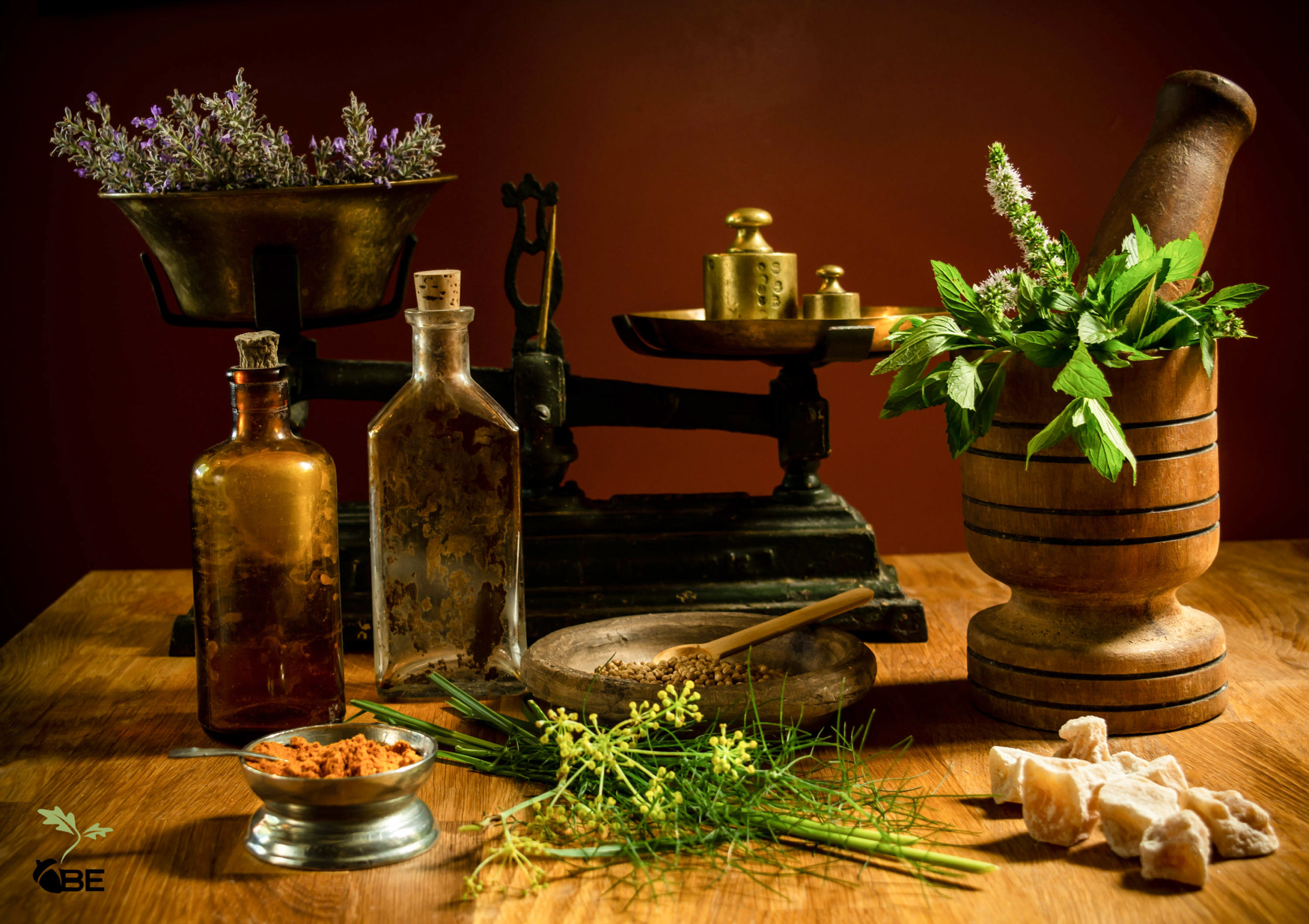
“Mother Earth’s medicine chest is full of healing herbs of incomparable worth.”
– Robin Rose Bennett
Everyone endures moments of stress from daily life that wound our feelings and functionality.
Remember that herbs are personal:
Go run your hands through the herb that calls to you. Pluck several leaves into the cup of your hands and bring it to your nose. Breathe in the curative fragrance, permitting it to enter your eyes, ears, nose, mouth, and even your throat.
Go out in the morning with the sunrise. Pinch back any flowers emerging on the tops of the herb plants (so they won’t go bitter putting all their energy into the flowers). Clip the leaves or stems you wish to add into your cooking or for whatever reason, and you will notice that the natural oils of the plant are at their highest potency. Distilled by nature, these oils are remedial at your touch and dominate the smells of the fresh air.
Watch…
Listen…
Breathe…
Instantly, your mood changes.
Your troubles seem less worrisome.
Your pain melts away.
You are brought to yourself for a few peaceful moments.
Herbs Heighten
Living things like trees, flowers, animals, even grass and weeds, heighten the experience and relationship we have with nature.
All forms of horticulture from ornamental flowers to multi-functional vegetables and herbs create gardens that affect sight, smell, taste, touch, and sound (with birds, insects, and rustling leaves) for a total sensory package.
Herbs are one of the key components of the essential oils and lotions used in aromatherapy. While in Bali, Indonesia, I experienced the luxury of a Javanese deep-muscle massage. However, before beginning the treatment, the attendant asked me to select between four jars of oils. Carefully, she removed the lid of the first one and allowed me to breathe for a few minutes the dominant scents. She replaced the lid, waved a palm frond to clear the air, and opened the next jar. She repeated the process until she had unlidded all the jars in turn. Although I could have selected one at random, by using all my senses in the selection, I knew which one heightened my senses and alerted my body to that which would bring the best healing and uplift to my muscles. For the next hour and a half, that smell governed the massage chamber and kept my muscles relaxed.
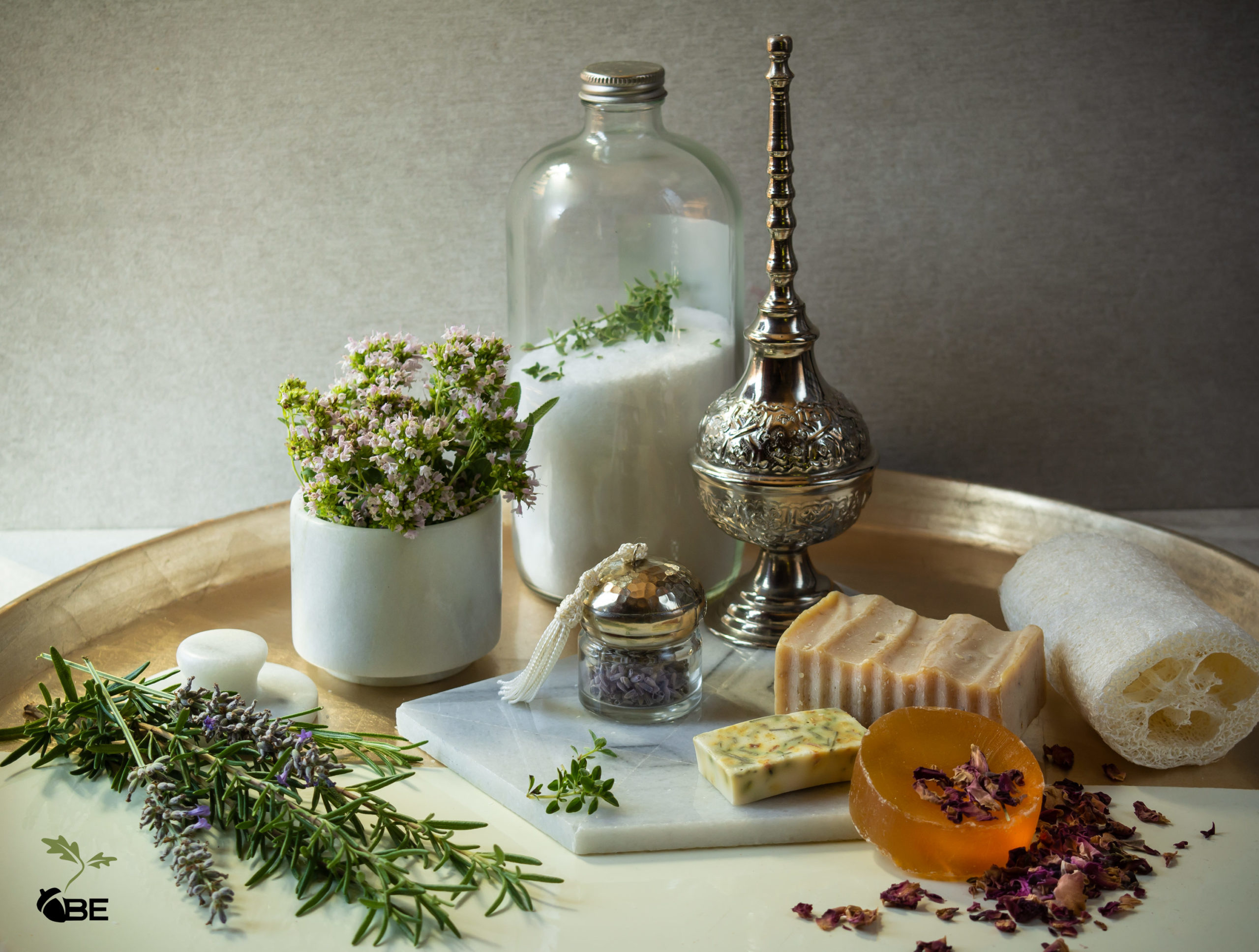
“My love affair with nature is so deep that I am not satisfied with being a mere onlooker, or nature tourist.
I crave a more real and meaningful relationship.”
– Euell Gibbons
Without a doubt, herbs heighten any culinary dish. Chicken loves to adorn itself in whatever flavors surround it, so roasting chicken with bold herbs like rosemary, sage, and lavender only brings out the exquisite flavor in the meat. Cheese, especially soft cheese, has always found a harmonious relationship with herbs worked into the cheese or blended in a marinade. Fresh basil tossed in a pasta salad or cilantro in a fresh salsa raises the vegetables to their best taste. Dried herbs alone or in combination like Herbes de Provence added to soups, sauces, and meats add irresistible dimension.
Abundantly, herbs and spices find their way with warm reception into the open arms of many of our recipes. With all the varieties of herb flavors such as Italian basil to sweet basil to cinnamon basil or tangerine sage to pineapple sage, the opportunities to experiment with flavors and combinations remain endless. We have used chocolate mint to make a mint chocolate cake, lemon balm to make lemonade, and lemon thyme to make our signature sablés.
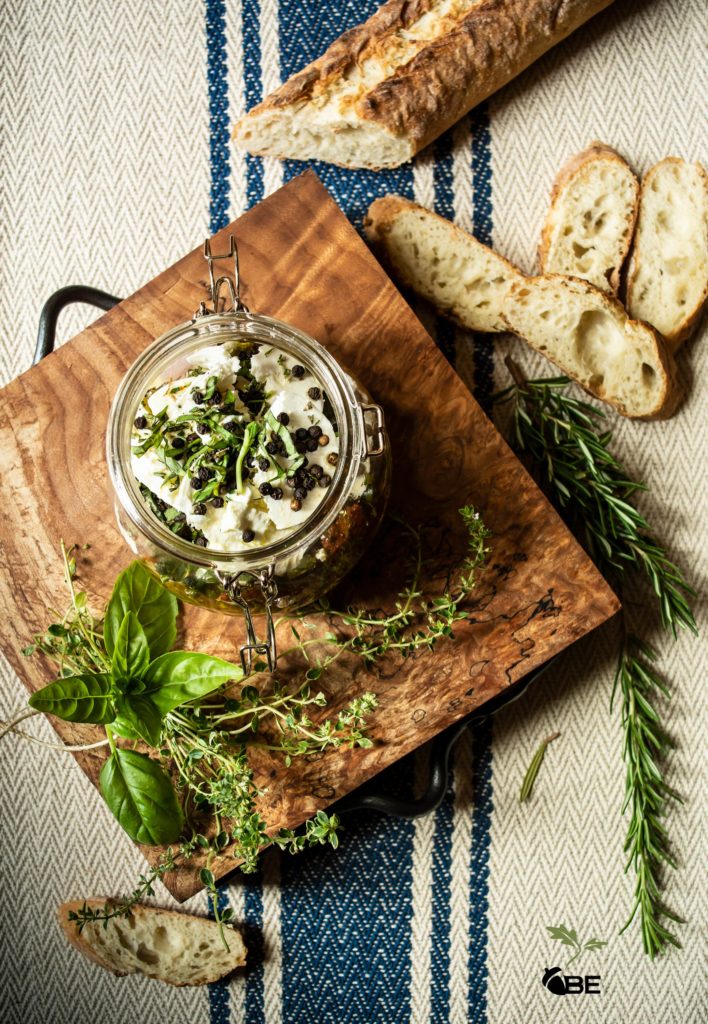
Allow herbs to have a place in your life. These little plants, fairly drought tolerant, can grow in the tiniest pot of rich soil in a sunlit window, requiring a little water and ability to drain. So, plant some fresh herbs and watch the magic happen as they grow graciously to uplift, heal, and heighten. May their flavorful, aromatic virtues bless your life.
Robyn J. Mock

©Be the Beautiful Life All Rights Reserved
